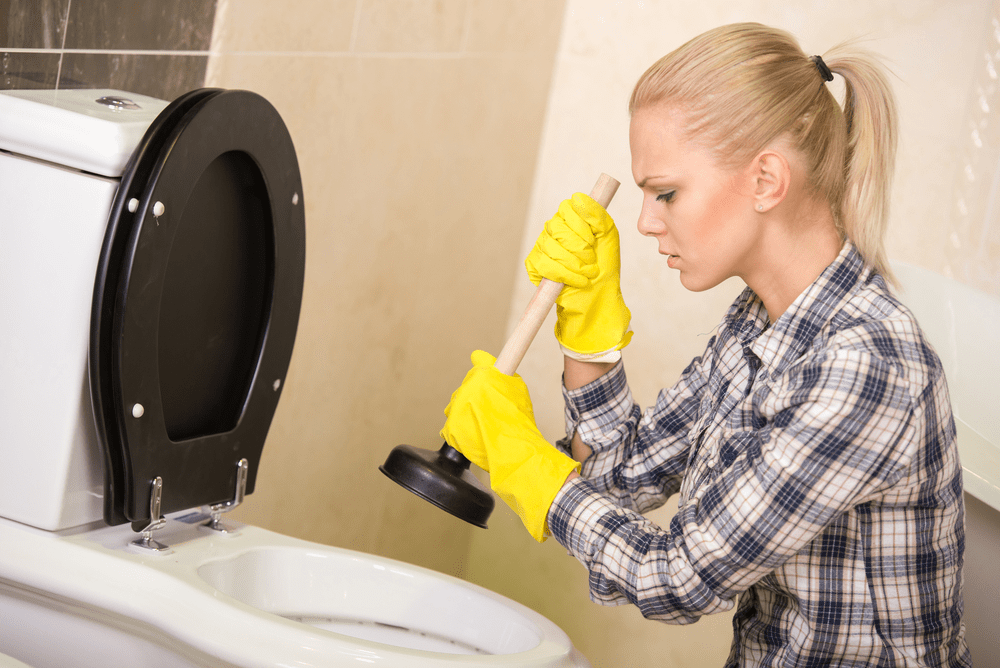
Do you know how to plunge a toilet?
Imagine you’re facing down a clogged toilet: dirty water close to the rim, a mass of paper and #2 nastiness blocking the drain. One more flush will overflow the toilet, flooding your bathroom.
So, do you know how to plunge a toilet when the stakes are high?
You’ve got the trusty plunger in hand, but one wrong move might do more harm than good. That’s why you’re here. That’s why you Googled something like “how to plunge a toilet?”
We’ve got your back. You can learn how to plunge a toilet right here.
Some plungers are better at unclogging drains and sinks, while some plungers are better at unclogging toilets.
HOW TO PLUNGE A TOILET: STEP-BY-STEP
Important: These tips are ONLY for clogs you made yourself. If you don’t know what clogged your toilet, there may be a deeper problem at hand. If your toilet clogs frequently, you may have a more serious issue. We’ll get to that later.
How to plunge a toilet:
1. Run the business-end of the plunger under hot water. This softens up the plunger so it can form a tighter seal with your drain. Only do this step if you feel your plunger is clean enough to rinse in your shower or sink.
2. Carefully submerge your plunger into the toilet. Too much force can necessitate the mop-n-bucket cleanup you’re trying to avoid. This holds especially true when the toilet is close to overflowing.You may need to wait a few minutes if the water level is too high.
3.Make a tight seal between the plunger and the clogged drain. The tight seal is crucial — this can take a little while to get right. Remember, you’re plunging a drain not stabbing it into submission.
4.At first, plunge carefully. The plunger head may be full of air; too much force can make a mess.
5.Plunge the toilet strenuously, putting equal weight into both the up and down motions.
6.Remove the plunger quickly to break the seal. The force will either cause the clog to be pushed down the drain or pulled back into the bowl. If the clog is pushed down the drain, good work. If the clog is pulled back into the bowl, it’ll likely be broken up enough to be flushed normally.
7.Test the toilet with a flush.
8.If the test goes well, you’re good to go. Clean your plunger and wash your hands.
CLOGGED DRAINS AND SEWER LINES
Most toilet clogs are innocent accidents. But if you didn’t clog the toilet with half a roll of toilet paper, you may be in trouble.
Frequent, unexplained clogs are often the result of a bigger plumbing problem. Problems like clogged drains or blocked sewer lines.
Ignoring either of those issues can lead to plumbing nightmares. A nightmare like a sewer line backup, which forces raw sewage up through every drain in your house.
HOW TO PLUNGE A TOILET: WRAP-UP
Now you know how to plunge a toilet—like a pro. Bookmark this page if you think you’ll need these tips again.
If you’re about to plunge a toilet, take a deep breathe (but hold your nose), and stay calm. You’ve got this.
Remember if you experience frequent toilet clogs, or clogs appear without explanation, you might have a bigger problem—like a blocked sewer line. The friendly plumbing experts of Benjamin Franklin Plumbing® of Ocean County.
Plumbing are ready to diagnose and fix your problem.
Contact us to discuss a pipe or sewer inspection and all of your plumbing needs
